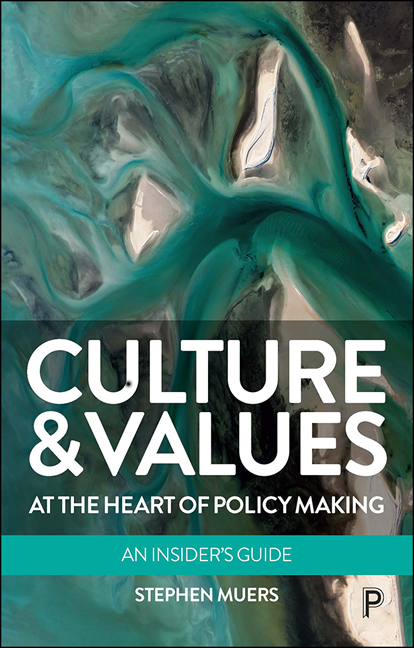Book contents
- Frontmatter
- Dedication
- Contents
- About the Author
- Acknowledgements
- Introduction
- 1 What are Culture and Values?
- Part One Why Culture and Values Matter for Public Policy
- Part Two How Culture and Values Shape the Political System
- Part Three How Policy Makers can Take Culture Seriously
- Conclusion
- Notes
- References
- Index
Introduction
Published online by Cambridge University Press: 18 March 2021
- Frontmatter
- Dedication
- Contents
- About the Author
- Acknowledgements
- Introduction
- 1 What are Culture and Values?
- Part One Why Culture and Values Matter for Public Policy
- Part Two How Culture and Values Shape the Political System
- Part Three How Policy Makers can Take Culture Seriously
- Conclusion
- Notes
- References
- Index
Summary
In 2007 I was working for the Prime Minister's Strategy Unit, part of the Cabinet Office in London. The Labour Party had been in a strong position in government for ten years, with large majorities in Parliament and weak opposition. As he came towards the end of his time as Prime Minister, Tony Blair initiated a ‘policy review’, a process that aimed to look at the achievements of his government and suggest directions for the future.
I was in charge of the section of this review looking at public services – health, education, criminal justice and so on. Improving these services had been a top priority for the Blair government. It had implemented major reform programmes, backed by increasing expenditure on health care in particular. It had set up the Delivery Unit, headed by Michael Barber, to bring to bear new ways of tracking and improving performance. Every year the Queen's Speech at the opening of the new Parliamentary year had heralded new legislation to reform the National Health Service, or schools, or childcare or other public services.
However, when government ministers gathered together as part of the policy review process to reflect on what they had achieved, my fellow officials and I heard an overwhelming sense of frustration. Minister after minister felt that nothing much had changed. While resource pressures in some areas had been eased, the fundamental dynamics of many services were very familiar from before they came to power. In particular, they were frustrated that large inequalities in health outcomes, educational attainment and vulnerability to crime had proved very hard to shift. For a progressive government like this one, that felt like failure. And as ministers talked about these frustrations, the concept that came up time and time again was ‘culture’. The culture of the public service agencies, and the culture of the communities they served, were so strong and deep-seated that the best reform programmes, backed up by money and expertise, couldn't compete.
As a result of this strong message from our political masters, my colleague David Knott and I wrote a paper about culture change and how government could think about it.
- Type
- Chapter
- Information
- Culture and Values at the Heart of Policy MakingAn Insider's Guide, pp. 1 - 6Publisher: Bristol University PressPrint publication year: 2020



